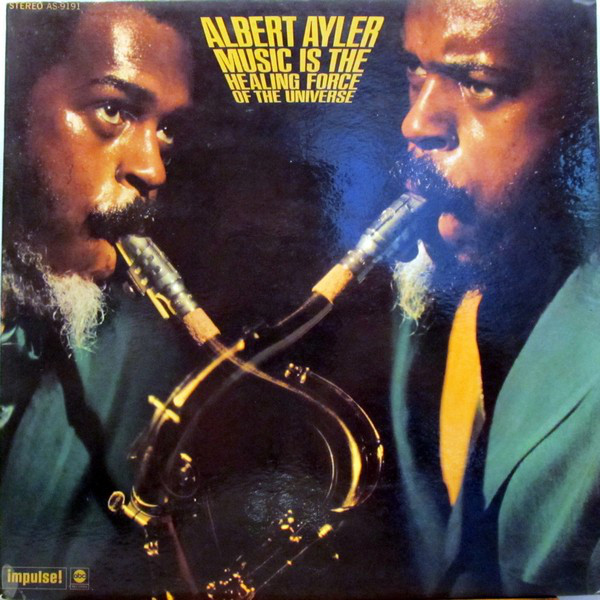
“In the summer of 1963, a tenor saxophonist named Albert Ayler moved into a room in a flat owned by his aunt, across the street from St. Nicholas Park in Harlem. It wasn’t the 27-year-old’s first trip to New York City, but this time he’d come intending to stay. Ayler was heading into the New York jazz epicenter as a complete unknown. It was a tumultuous time for a music in the process of splintering into fragments, building on its storied past but unsure where it would go next. Giants of bebop like Dizzy Gillespie and Thelonious Monk were alive and well and cutting important records (the latter would in another year be on the cover of Time); Miles Davis was in a transitional period, but was on the verge of making some of his finest work, with his second great quintet right around the corner; Charles Mingus was humming at a creative peak, and Duke Ellington had been canonized but was still busy. If you wanted to be someone in jazz during this era, a time when the music still commanded attention, New York, then as now, was the place to be. …”
Pitchfork

Tag Archives: Albert Ayler
How Pharoah Sanders Brought Jazz to Its Spiritual Peak with His Impulse! Albums

“With Ayler’s statement about jazz’s so-called ‘New Thing,’ the metaphor was cast. Of course John Coltrane – the giant of the tenor saxophone who brought Eastern thought to bear on his own music – was deemed the father. It was ‘Trane who gave his blessing to the next generation of players: Archie Shepp, Marion Brown, John Tchicai, Dewey Johnson, Pharoah Sanders, Albert Ayler and more before Coltrane left his earthly body in 1967. And it was Ayler who best embodied the fiery cast of free jazz, burning bright only to burn out, dragged out of the East River at the age of 34. Yet as he nears his 75th year, Sanders’ body of work does not enjoy nearly the same reverence, awe and praise as the others in the holy trinity of spiritual jazz. Coltrane continues to be the subject of colossal box sets and deluxe reissues, Ayler has had every scrap of recorded music culled and collected, while Sanders’ oeuvre stands in disarray. His eleven Impulse albums – from 1967’s Tauhid to 1974’s Love in Us All – comprise arguably the greatest run on the label. Yet outside of 1969’s Karma, none of Pharoah’s Impulse albums are currently in print in the U.S. Half of them are unavailable on CD or vinyl, the other half are bundled as two-for-one budget imports, with no remastering or bonus tracks. Most of the ink given to Sanders appears at the tail end of Coltrane bios, noting that Sanders was the lone horn player to share the bandstand with Coltrane at the end of his life. In Ornette Coleman’s estimation, Sanders is ‘probably the best tenor player in the world.’ And while Sanders has released many albums on many labels, nothing matches his Impulse years. The music he made with large ensembles in the late ‘60s and early ‘70s drew from the jazz tradition, but elevated the form so as to embrace gospel, soul, African folk, R&B and what would soon be deemed world music, weaving it all into a tapestry that spoke of African-American identity, spiritual realization and world peace. …”
Red Bull Music Academy Daily (Video)
Albert Ayler – Spiritual Unity (1964), Music Is the Healing Force of the Universe (1969)

“The harshest tone can also be the sweetest, if expressing an attempt to move beyond words to explain the passion of the moment. If it is expressing NOW. Free jazz, noise and other genres have clearly shown that while that music may be ear-splitting gibberish to some as well as unmusical and indulgent, but to others it is a spiritual path. All religions talk of a moment of advanced insight within which words are beside the point. Loud, free improvisational music obliterates thought and explanation; for some that opens the mind up for new ways to experience the world. Artists as disparate as John Coltrane, Merzbow, Derek Bailey and Neil Young have explored not only the catharsis of full-volume freeform expression, but also have not been afraid to acknowledge the spiritual benefit of that expression. Certainly Albert Ayler’s entire career was built on accessing the holy spirit through pure, wordless sound. Despite his lack of commercial success in his career, musicians from every generation since have found inspiration in his fearlessness, his searching, his ‘barbaric yawp,’ as Walt Whitman would say. So, what becomes a tribute most? Imitation or expansion of ideas, a focus on the seeds of influence or on the fruits? To be or not to be reverent? These questions are most acute when that artist is Albert Ayler. What’s the best way to pay tribute to him? Use his music as inspiration for one’s own improvisational workouts? Or look beneath the chaos to find harmonies and compositional prowess hidden beneath the din? …”
PERFECT SOUND FOREVER: Recent Tributes to Albert Ayler
Healing Force: The Songs Of Albert Ayler
NPR – Albert Ayler: Testifying The Breaking Point (Audio)
W – Spiritual Unity, W – Music Is the Healing Force of the Universe
YouTube: Spiritual Unity (full abum) 29:38, Music Is The Healing Force Of The Universe 6 videos
